Benefits Of Apple Cider Vinegar For Hair Loss & How To Use It
Seems like ACV has got it all covered, from helping weight loss to fighting hair loss.

Image: Shutterstock
The benefits of apple cider vinegar for hair loss are many. It helps balance the pH of the scalp, which could otherwise get disturbed by several alkalinei Anything that has the properties of an alkali and a pH greater than the neutral pH of 7 (anything between 7.1 and 14). hair care products. Also, ACV helps fight against dandruff and itching and imparts shine to your hair. This article explains how apple Cider vinegar can be an effective hair treatment to reduce hair loss. We also discuss how you can use ACV and the potential risks you need to be wary about. Keep reading.

 Know Your Ingredient: Apple Cider Vinegar
Know Your Ingredient: Apple Cider VinegarWhat Is It?
A type of vinegar made with crushed and fermented apples, yeast, and sugar.
What Are Its Benefits?
It can strengthen hair, balance the scalp and hair pH, remove buildup, and treat dandruff.
Who Can Use It?
Anyone can use it, as it is safe for all hair types, including color-treated hair.
How Often?
It can be applied a few times a week, depending on how oily or dry your hair is.
Caution
Some people may be allergic or sensitive to it. Excess undiluted ACV can cause brassiness, chemical burns, and hypersensitivity in your scalp.
In This Article
How Is Apple Cider Vinegar Made?
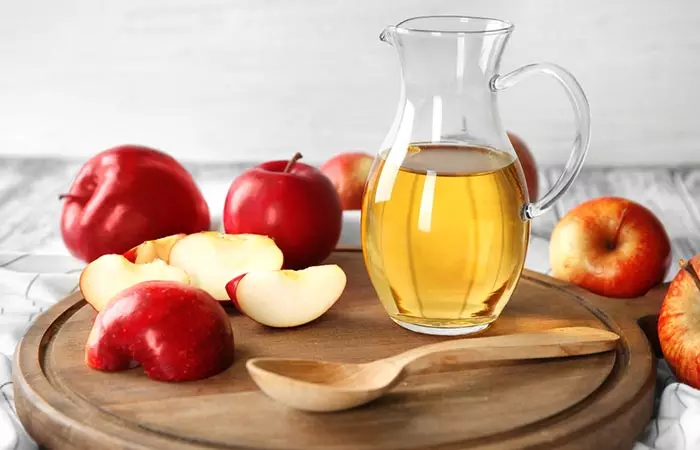
Apple cider vinegar is made from the juice of crushed apples. This juice is extracted and exposed to bacteria and yeast, and its sugars are converted to alcohol. This is fermented again, and the alcohol converts to apple cider vinegar (1).
 Did You Know?
Did You Know?Apple cider vinegar may have antifungal, antibacterial, and anti-viral properties (2). These properties may help deal with hair issues by improving hair nourishment. But how does vinegar work?
Key Takeaways
- Apple cider vinegar is made from fermented apple juice and contains antibacterial and antifungal properties.
- It can help balance hair pH, treat dandruff, and remove scalp buildup.
- You can use diluted ACV after shampooing or include it in your diet to promote hair growth and add shine
- Excessive use of ACV can damage hair. Therefore, limit its use to twice a week.
How Can Apple Cider Vinegar Help With Hair Loss?

Shedding 50 to 150 hair strands a day is normal (3). Hair fall and loss can happen due to a variety of reasons. Factors like stress, illness, and nutritional deficiencies can affect hair growth (4).
Following are the various ways apple cider vinegar may help treat hair loss:
- Balances Hair pH
The pH of hair is 4 to 5, making it slightly acidic. Maintaining the natural pH of hair is crucial to protect it from external damage, and to keep it healthy, smooth, and shiny. However, most shampoos on the market have an alkaline pH. This could alter the natural hair pH and lead to cuticle damage and harm the hair fibers (5).
Apple cider vinegar contains acetic acid and has a low pH (is acidic) (6). Theoretically, using it may restore the natural hair pH. However, more studies are warranted in this regard.
- May Remove Scalp Build-Up
Using different hair products, sweat accumulation, and oil secretion can cause scalp build-up and eventually lead to irritation.
A diluted apple cider vinegar solution may help remove scalp build-up. However, more research is required in this regard.
- May Boost Hair Follicle Growth
Poor blood circulation to the hair follicles could inhibit hair growth
(7). Some believe that apple cider vinegar may improve blood circulation. The antibacterial properties of apple cider vinegar may help cleanse the scalp hair roots, and follicles. This may promote hair regrowth.
- May Boost Hair Shine
Apple cider vinegar may help smoothen the hair cuticle (the outermost protective layer of the hair). The acetic acid in ACV reduces frizz and restores hair pH, which could have been altered by alkaline shampoos. Its amino acids and fatty acids may boost hair shine (8).
Maria Nicholas, a blogger, shared she uses apple cider vinegar to make her hair shiny. She dilutes the vinegar with water and applies it to her hair. In her blog, she wrote, “From my natural alkalizing remedy to shining my hair to removing pesticides from my fruit, ACV has become a staple product in my house (i).”
- May Help Treat Dandruff
Apple cider vinegar has antifungal properties (9). It may help in dandruff treatment. Some believe its high acidity could make it difficult for the fungus to thrive. However, more research is required in this aspect.
- May Fight Free Radicals And Premature Aging
Antioxidants can fight free radicalsi Oxygen-containing molecules carrying electrons in uneven numbers that can damage cells, causing illness and aging. (10). The vinegar contains some citric acid, which has been identified as an antioxidant (11). It may help fight free radicals.
 Did You Know?
Did You Know?The benefits of apple cider vinegar for natural hair are yet to be extensively studied. Many follow and use these hair care tips nonetheless. The following section tells you how.
How To Use Apple Cider Vinegar For Treating Hair Loss
As An External Rinse
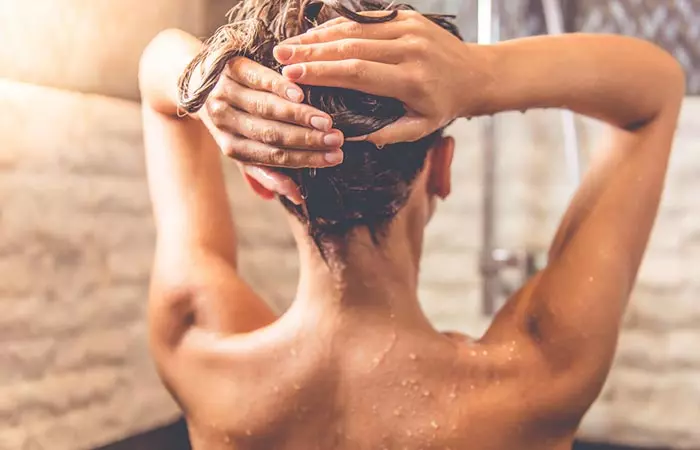
Ingredients
- Water: ½ a liter
- Apple cider vinegar: 2-5 tablespoons
Process
- Mix the two ingredients in a glass jar.
- After cleansing your hair with shampoo, pour the apple cider vinegar mixture over the hair.
- Tilt your head down to ensure the solution does not come in contact with your eyes.
- Massage for a couple of minutes and rinse again with plain water.
- Go ahead with a conditioner and dry your hair with a clean towel.
Make It A Part Of Your Diet

Apple cider vinegar can be used in cooking to add a vinegary flavor to food. However, there is little research on the benefits of ACV intake on hair loss.
As A Supplement
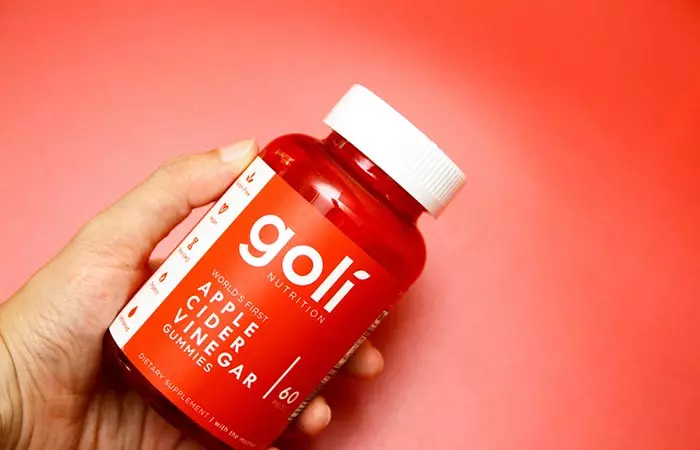
If your doctor recommends, go for an apple cider vinegar supplement. But ensure you stick to the dosage. Excess intake of ACV for a prolonged period can cause hypokalemiai A condition where the potassium levels in the blood are too low, resulting in weak muscles, twitches, cramps, etc. or aggravate osteoporosisi A medical condition that causes brittle and fragile bones due to decreased bone mineral density and bone mass. (12).
One way of making the best out of ACV is knowing the right type you need to purchase. With a variety of options on the market, this could be a challenge. The next section will help you understand how to pick the best apple cider vinegar.
Choosing The Right Apple Cider Vinegar For Hair Care
Here are the factors to be considered before you purchase apple cider vinegar to use for your natural remedies.
- Filtered/Unfiltered: This does not matter if you are using ACV for a rinse alone. But if you are consuming it, unfiltered ACV is better as it will contain more nutrients.
- The “Mother”: The ‘mother’ is obtained from the fermentation process. It comes with brown cobweb bits floating at the bottom. It may look like it has gone bad, but actually is beneficial.
- Unpasteurized: You may purchase ACV that has not gone through any heating process. Unpasteurized ACV retains most of its good bacteria.
- Organic: Organic apple cider vinegar is ideal. One can also look for ’raw’ apple cider vinegar that has no artificial flavors or chemicals.
Choosing the right kind of apple cider vinegar may not necessarily mean it is safe for all. ACV could cause side effects in some. It also may show adverse effects if not used in the right way.
Risks Of Using Apple Cider Vinegar
- Undiluted ACV: Apple cider vinegar has a low pH and is highly acidic. Using it undiluted may cause scalp issues. Some research shows that apple cider vinegar could cause chemical burns on the skin (13). An ACV rinse must always be used diluted.
- Excess Use Of ACV: Using a highly acidic solution too often may cause more harm. Use the ACV rinse only twice a week.
- Allergies: Some anecdotal evidence suggests that ACV could cause skin allergies. However, relevant research is lacking. You may do a patch test before using ACV on your skin/hair. If you observe a reaction, stop use and consult a dermatologist.
Using a minimal amount of ACV and diluting it with water is always safe. You may gradually increase the amount of vinegar as the weeks pass.
Infographic: 5 Ways Apple Cider Vinegar Combats Hair Loss
Apple cider vinegar is a set cornerstone in various industries, from skin care to health, and has now successfully stepped foot into the hair care realm as well. If you are not aware of its hair benefits, let us enlighten you. Check out the infographic below to know 5 ways ACV may help reduce hair loss and promote healthy tresses.
Some thing wrong with infographic shortcode. please verify shortcode syntaxThe antifungal, antiviral, and antibacterial properties of apple cider vinegar make it an excellent solution to fight against hair care issues like hair thinning, low hair volume, and hair loss. You can also add ACV to hair masks to improve hair strengthening. It helps boost scalp health by removing build-up, improving blood circulation, smoothening the hair cuticle, treating dandruff, and ultimately improving hair texture. You can use ACV as an external rinse or a supplement in your hair care routine. However, since ACV is highly acidic, dilute it before using it. Consult your doctor to learn more about the dosage and ways to use it.
Frequently Asked Questions
How long should I leave apple cider vinegar on my scalp?
You shouldn’t leave diluted apple cider vinegar for more than 10-15 minutes on your scalp as it is acidic and can dry your scalp and hair.
What happens if you leave apple cider vinegar in your hair overnight?
Apple cider vinegar is weakly acidic and can result in hair breakage and dullness if left in your hair overnight.
Does apple cider vinegar affect hair color?
Apple cider vinegar can help maintain the vibrancy of your permanent hair color by sealing the hair cuticles.
Illustration: Benefits Of Apple Cider Vinegar For Hair Loss & How To Use It
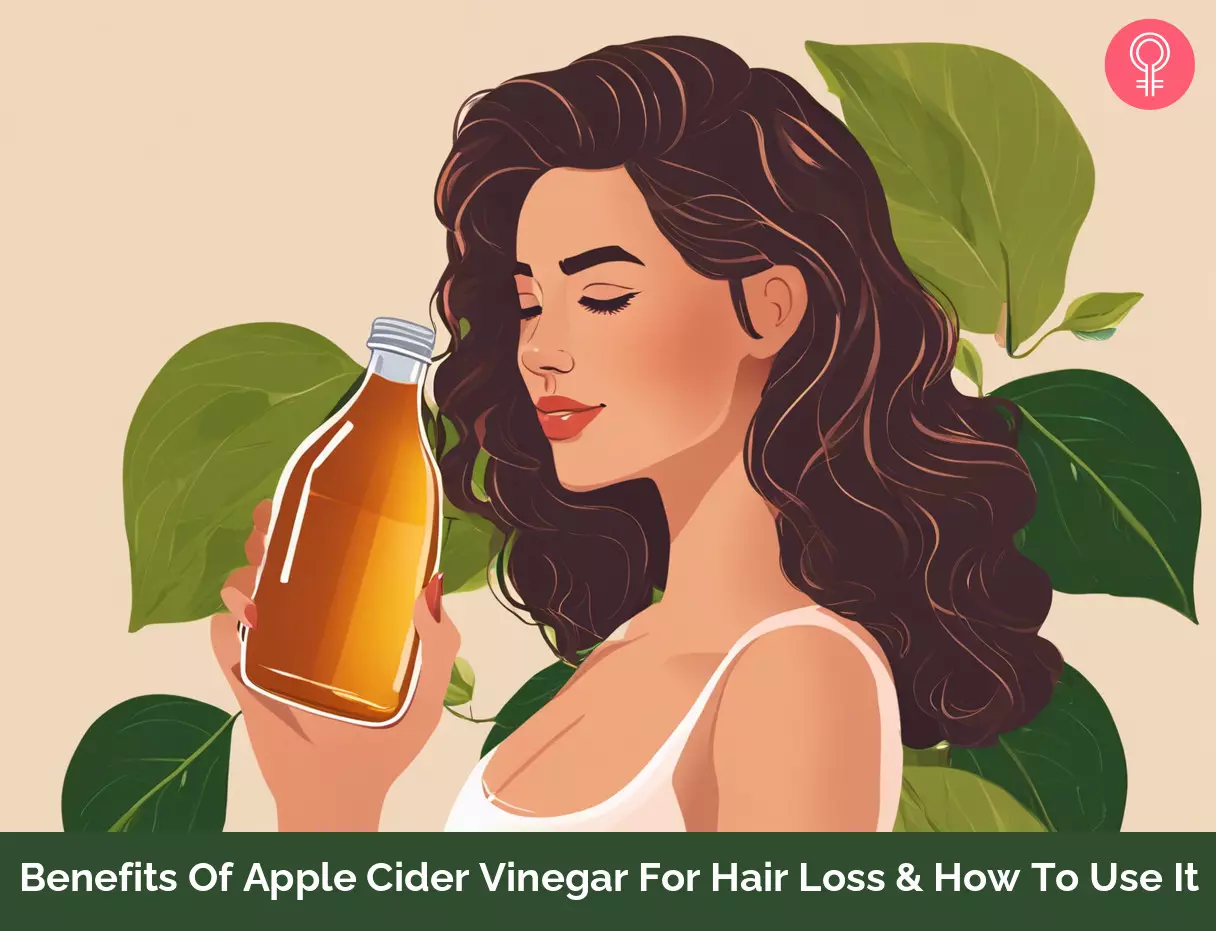
Image: Stable Diffusion/StyleCraze Design Team
References
Articles on StyleCraze are backed by verified information from peer-reviewed and academic research papers, reputed organizations, research institutions, and medical associations to ensure accuracy and relevance. Read our editorial policy to learn more.
- Microorganisms in Fermented Apple Beverages: Current Knowledge and Future Directions
https://www.ncbi.nlm.nih.gov/pmc/articles/PMC5620630/ - Authenticating apple cider vinegar’s home remedy claims: antibacterial, antifungal, antiviral properties and cytotoxicity aspect
https://pubmed.ncbi.nlm.nih.gov/29224370/ - DO YOU HAVE HAIR LOSS OR HAIR SHEDDING?
https://www.aad.org/public/diseases/hair-loss/insider/shedding#:~:text=It’s%20normal%20to%20shed%20between,this%20condition%20is%20telogen%20effluvium. - Hair Loss: Common Causes and Treatment
https://www.aafp.org/pubs/afp/issues/2017/0915/p371.html - The Shampoo pH can Affect the Hair: Myth or Reality?
https://www.ncbi.nlm.nih.gov/pmc/articles/PMC4158629/ - Acetic Acid, the Active Component of Vinegar, Is an Effective Tuberculocidal Disinfectant
https://www.ncbi.nlm.nih.gov/pmc/articles/PMC3940030/ - Male Androgenetic Alopecia
https://www.ncbi.nlm.nih.gov/books/NBK278957/ - Apple cider vinegar rinse
https://patents.google.com/patent/US9693948B1/en - Antimicrobial Activity of Apple Cider Vinegar
https://core.ac.uk/reader/236435410 - Free radicals, antioxidants, and functional foods: Impact on human health
https://www.ncbi.nlm.nih.gov/pmc/articles/PMC3249911/ - Vinegar: Medicinal Uses and Antiglycemic Effect
https://www.ncbi.nlm.nih.gov/pmc/articles/PMC1785201/ - Hypokalemia, Hyperreninemia, and Osteoporosis in a Patient Ingesting Large Amounts of Cider Vinegar
https://www.karger.com/article/abstract/45180 - Chemical Burn from Vinegar Following an Internet-based Protocol for Self-removal of Nevi
https://pubmed.ncbi.nlm.nih.gov/26155328/
Read full bio of Dr. Shruti Chavan
Read full bio of Arshiya Syeda
Read full bio of Ramona Sinha
Read full bio of Medha Deb






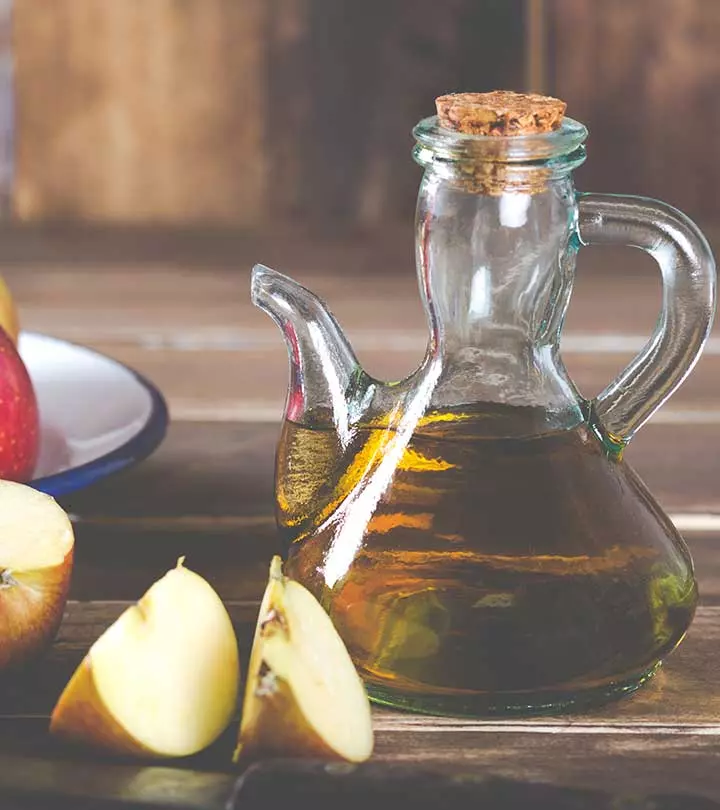

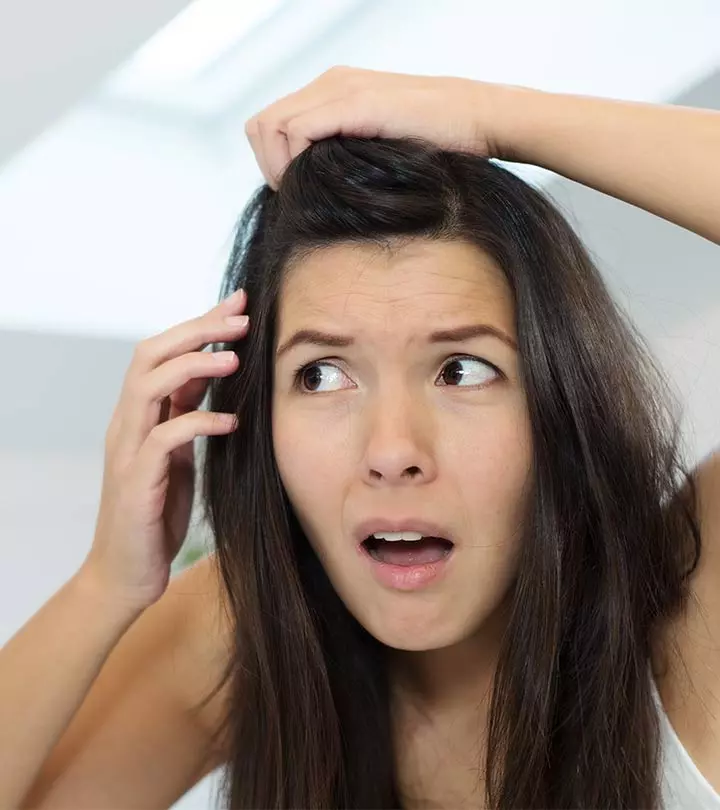



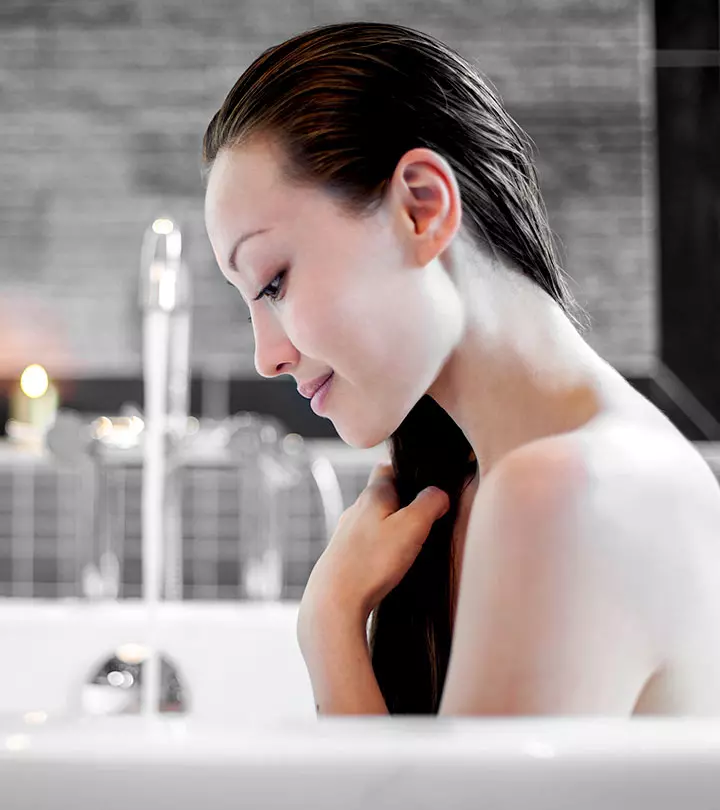
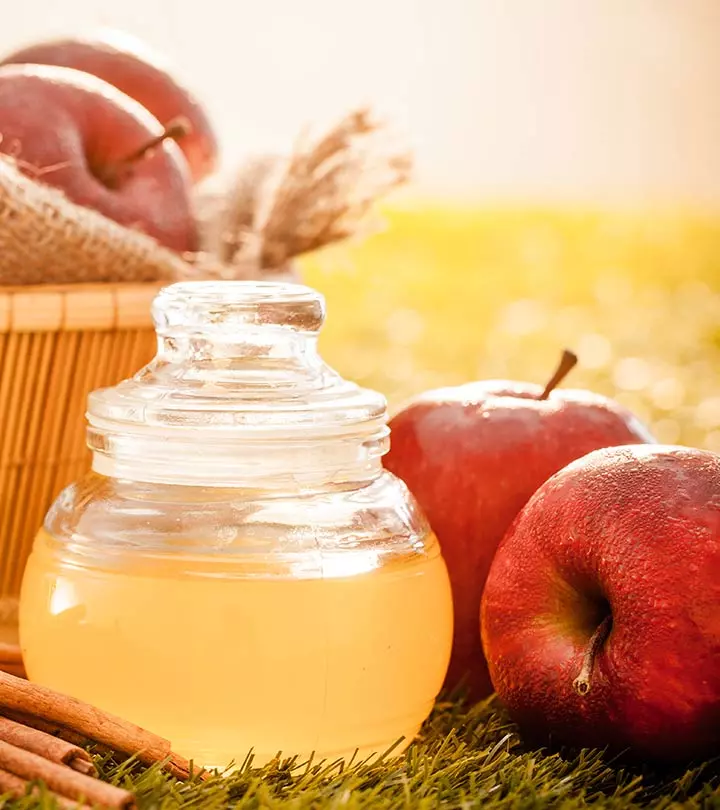
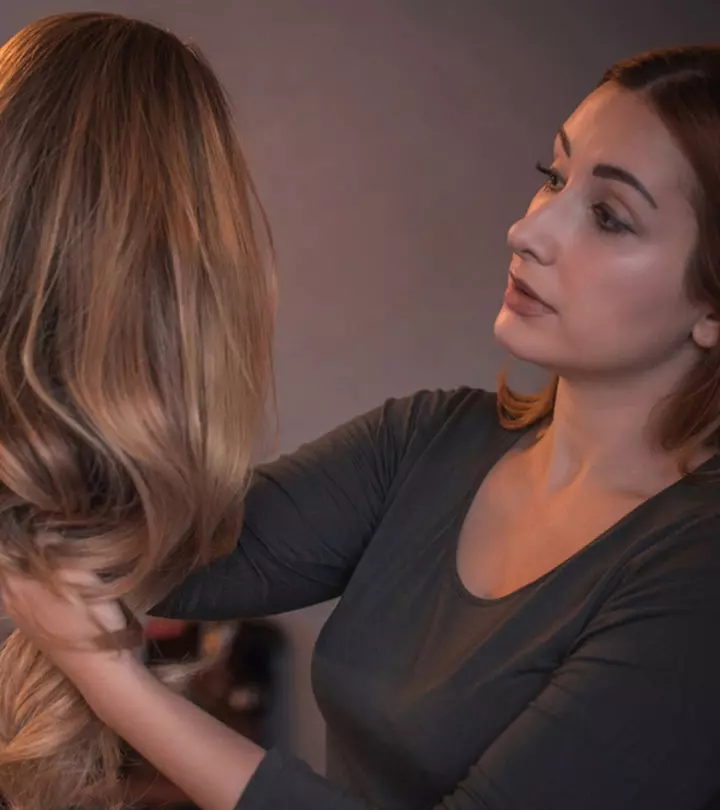



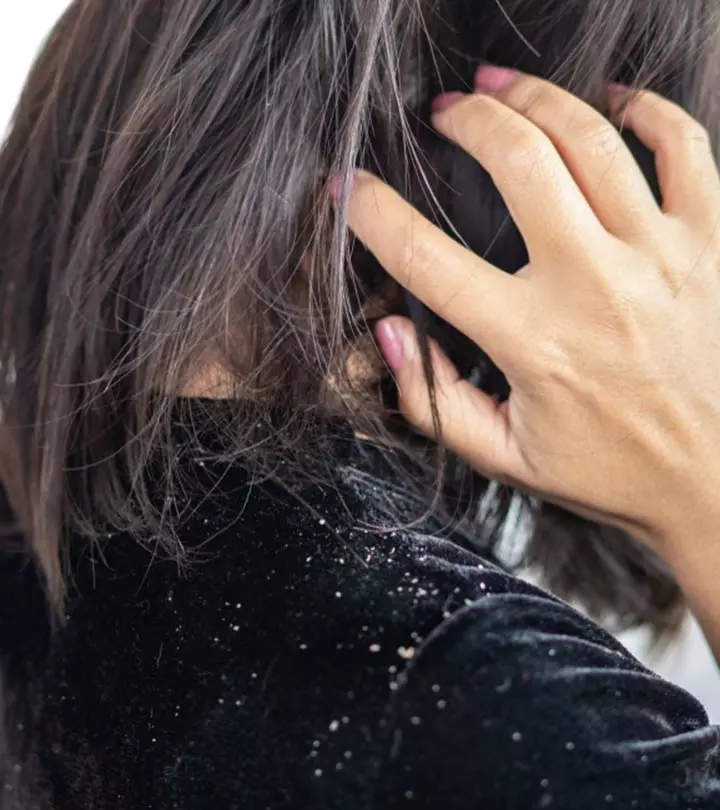
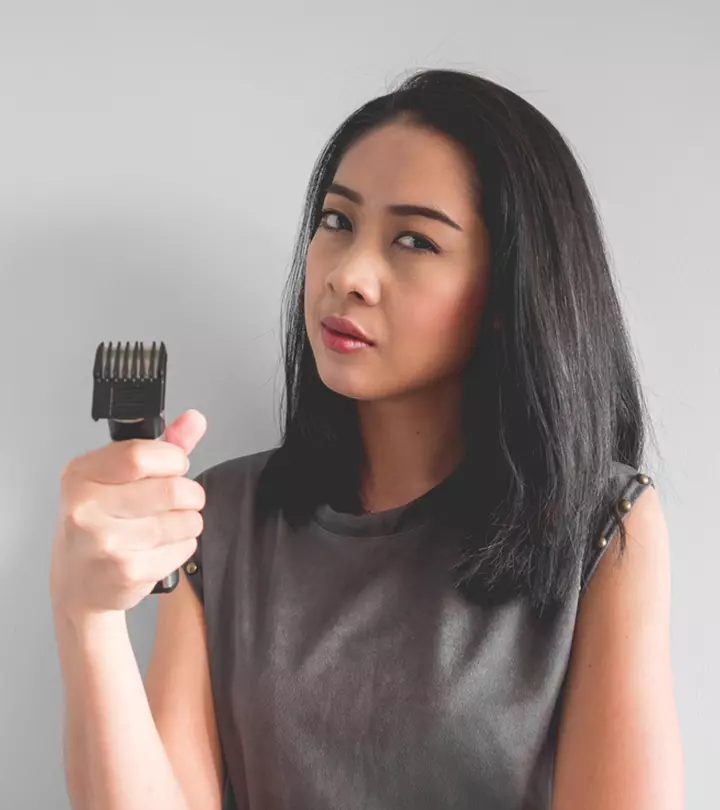
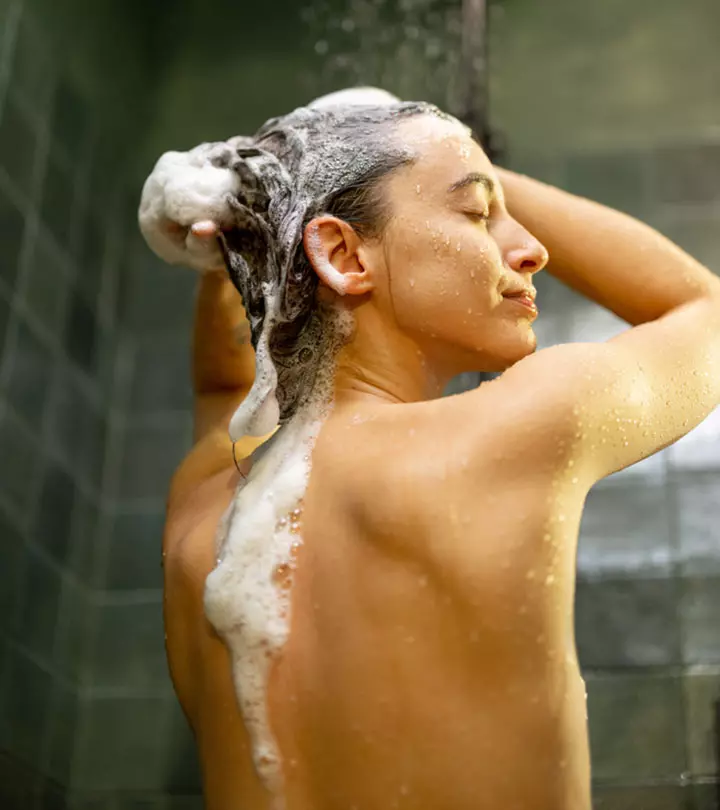

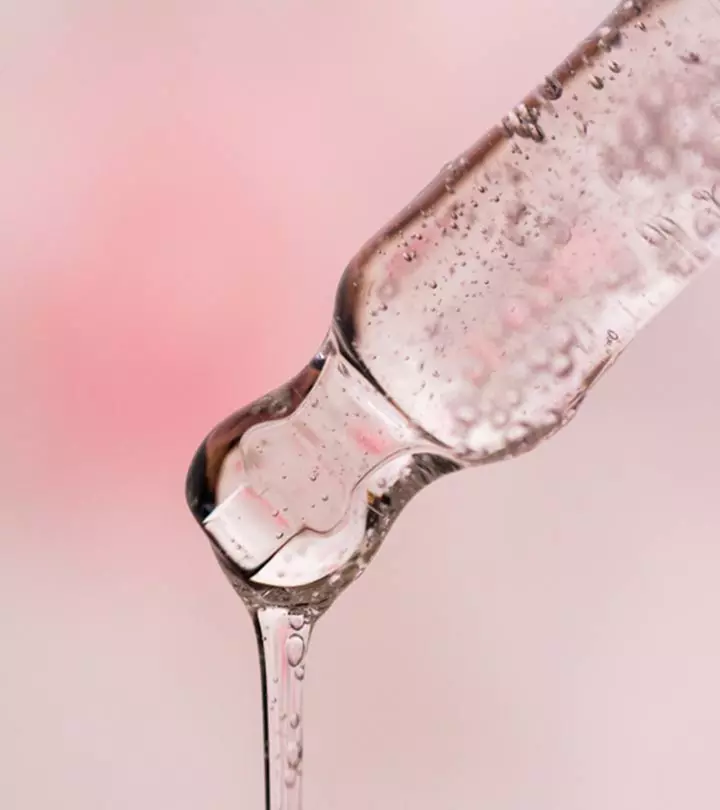

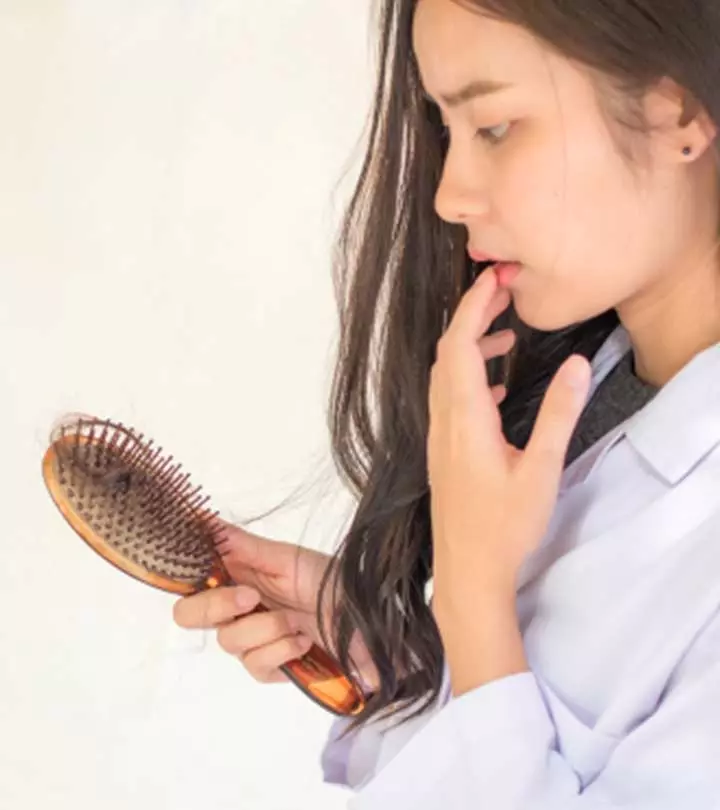


Community Experiences
Join the conversation and become a part of our empowering community! Share your stories, experiences, and insights to connect with other beauty, lifestyle, and health enthusiasts.